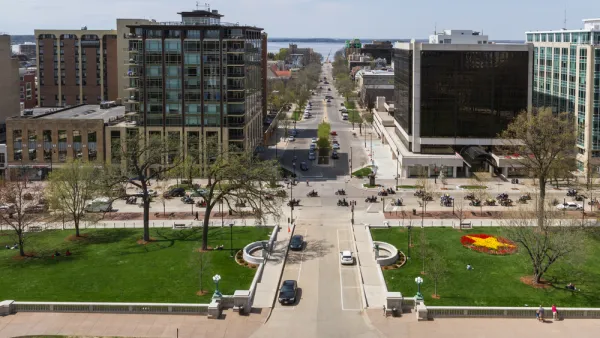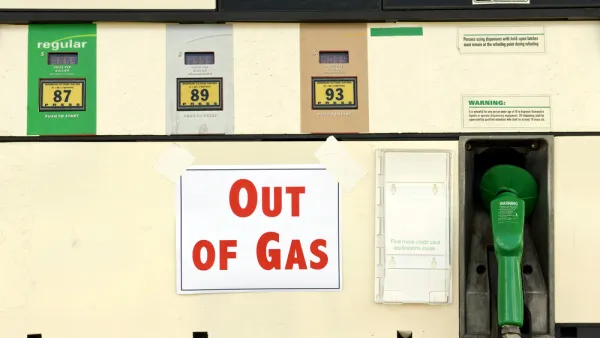Without an automatic adjustment for gas taxes, revenue from the tax declines due to increasing fuel efficiency standards while road maintenance and construction costs increase due to inflation. Witness Wisconsin's woes.

Like most states, Wisconsin relies to a great extent on user fees, particularly the gas tax, to fund its roads. [How does your state pay for its roads?]
But that share has been declining since the legislature abolished the practice of automatically adjusting its gas tax in 2006, now stuck at 32.9 cents per gallon for over 11 years. [When did your state last increase its gas tax?]
Furthermore, it's not only causing transportation headaches for the legislature, it's also holding up the budget process, reports Marti Mikkelson for WUWM (Milwaukee Public Radio–listen here).
“Up until that point, there had been an automatic increase based on several different variables and there was always a little more money coming in. Once you eliminated those automatic increases, then you essentially ended up with a stagnant revenue pool,” Wisconsin Taxpayers Alliance spokesman David Callende says.
Republican Gov. Scott Walker has not been helpful. "When he took office in 2011, he made it clear, that there would be no increases in registration fees -- or gas taxes -- in his budgets," adds Mikkelson.
Unlike some states, like California, where hiking taxes often comes down to a partisan divide, in Wisconsin, a Republican trifecta, an "ideological split between the GOP leaders in the Assembly and Senate complicates the search for answers," according to JR Ross of wispolitics.com.
Two user fees not taken off the table are adding road tolls near the state borders, with the idea of catching out-of-state motorists, and adding a vehicle-miles-traveled fee for heavy trucks, aka weight distance tax, both described here last month.
A proposal to add a sales tax to fuel purchases and reduce the gasoline excise tax posted in May apparently failed.
Wisconsin has plenty of company
According to a June 28 publication by the Institute on Taxation and Economic Policy (ITEP), "thirty states and the federal government levy fixed-rate gas taxes where the tax rate does not change even when the cost of infrastructure materials rises or when drivers transition toward more fuel-efficient vehicles and pay less in gas tax."
However, it's not always easy legislating automatic increases to the gas tax, as Massachusetts lawmakers discovered in 2014.
Hat tip to AASHTO Daily Transportation Update
FULL STORY: Why is Transportation Such a Stickler in The Wisconsin State Budget?

Analysis: Cybertruck Fatality Rate Far Exceeds That of Ford Pinto
The Tesla Cybertruck was recalled seven times last year.

National Parks Layoffs Will Cause Communities to Lose Billions
Thousands of essential park workers were laid off this week, just before the busy spring break season.

Retro-silient?: America’s First “Eco-burb,” The Woodlands Turns 50
A master-planned community north of Houston offers lessons on green infrastructure and resilient design, but falls short of its founder’s lofty affordability and walkability goals.

Test News Post 1
This is a summary

Analysis: Cybertruck Fatality Rate Far Exceeds That of Ford Pinto
The Tesla Cybertruck was recalled seven times last year.

Test News Headline 46
Test for the image on the front page.
Urban Design for Planners 1: Software Tools
This six-course series explores essential urban design concepts using open source software and equips planners with the tools they need to participate fully in the urban design process.
Planning for Universal Design
Learn the tools for implementing Universal Design in planning regulations.
EMC Planning Group, Inc.
Planetizen
Planetizen
Mpact (formerly Rail~Volution)
Great Falls Development Authority, Inc.
HUDs Office of Policy Development and Research
NYU Wagner Graduate School of Public Service




























